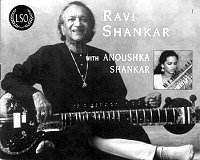Ravi Shankar and his young daughter Anoushka, with two tablas, and two tanpuras to provide the essential 'drone' background, offered us an astonishing feast in celebration of Ravi Shankar's 80th Birthday.As a Westerner, and sadly forever an outsider, it is only possible to give an impressionistic appraisal of the communicative qualities inherent in Indian music. In the programme, a helpful essay by Ravi Shankar himself gave a hint of the formidable formal complexities of the ragas. During the long evening we were in turn charmed, beguiled, moved and intoxicated by this exciting and ravishingly beautiful music.
Anoushka Shankar held the fort during the first half, with the mainly Western audience in the dark reverentially silent and focused on the musicians on a dais. There was none of the colourful ambience and audibly participatory mood encountered at some Indian concerts.
Anoushka took some fifteen minutes over the alap, the slow introductory exploration of the first raga, giving us, and herself, time to gather concentration. She then slid into a performance which was as fresh and lively as morning dew. The playing became animated, insistent and incisive, almost argumentative. After having had her say with a virtuosic display the music suddenly and gracefully bowed out.
The second raga started as an animated conversation with the tabla players to left and right. Happy, playful, animated and jokey exchanges developed into a race to say as much as possible, so fast she almost fell over herself - very suited to her youthfulness. It expressed a great zest for life.
The third raga started in a gentle, tender and reflective mood but an irrepressible vitality very quickly took hold again. After drawing the tabla players into her orbit she moved, very politely, into the background to let them have a chance to talk between themselves. A quieter, more sedate rhythmic but very virtuosic conversation ensued.
Anoushka Shankar displayed great refinement and sensitivity amid her affective and infective youthful exuberance.
After the interval, Ravi Shankar was greeted with a prolonged standing ovation, demonstrating the great esteem in which he is held. Flash photography took hold of the auditorium with ushers running around, unable to control this silent electric storm! Sitting beside him, Anoushka gracefully retreated into the background during the second half of the concert leaving her illustrious father to enthrall us.
At the start of the first raga, dedicated to the memory of a friend, he made the instrument sing plaintively with great intensity and depth. The eloquent expressiveness exuded a radiant beauty. The electronic enhancement was almost imperceptible and did not disturb the inner stillness. He dared the music to be quietly understated with barely articulated sounds. It was all the more compelling for being gentle and allusive rather than forcefully stated. His playing attained a magical, sublime quality, totally enthralling, the kind of sound you wish would carry on and on and on with no end.
This long introspective monologue transformed itself only gradually into a quietly intense and lively mood with a myriad of rivulets of sound flooding the auditorium, becoming utterly virtuosic and participatory. (None of this would have been possible with the kind of crude amplification which is now often used so destructively.) After having had a full say, a quiet mood took hold again.
The playing of the second raga was breathtaking. It started like a drawing room conversation with lazily meandering talk among all the participants and with interjections, in turn, by one or another player. There was laughing, teasing and a sense of having a good time. The musicians were light-hearted and comfortable with each other, no one dominating at first. Gradually the grand old sitar man took over with good humour and a gentle natural authority, and an assured aesthetic sensibility which was supremely expressive.
The third raga was a truly astonishing and spellbinding tour de force. The energy and concentration required and displayed could be the envy of an artist half his age. He started with lovingly stroked sounds creating enveloping gossamer textures, unafraid to indulge in thrilling sensual sounds. He then opened up into an exquisite playfulness, sharing it with the other musicians, drawing subtle nuances from his instrument like an assured and confident lover, and breaking into a dance with the tabla players. The life enhancing eroticism of this refined aesthetic was totally enthralling. Sombre notes, which were suddenly allowed to intrude for a while, were dispelled with driving sounds to allow the conversation to restart while dancing. Popular music also made an appearance, creating an interlude of jollity. They were all unafraid to have fun, whilst coaxing and heightening each other with twists and turns, on towards a tense, wild, electrifying, almost impossible and unbearable climax.
This was indeed vibrant and incandescent music making with the breath of life entering into each note.
Alexa Woolf
Having been an ignorant devotee of Indian music for some fifty years, ever since Ravi Shankar and Ali Akbar Khan began coming to UK to bring its riches to the notice of audiences in small halls, it was a moving experience to hear Ravi Shankar again at the beginning of a new century, appearing undiminished in old age, and received by a capacity audience of thousands of London admirers. It was apt that he took this opportunity to demonstrate the continuity of Indian Classical Music by introducing his daughter to us. The event was all the more satisfying after the debacle of a recent concert reviewed by S&H (Abida Parveen at RFH, 30 May) which for us was completely spoilt by over-loud and distorted amplification, a blight against which I have been campaigning, with diminishing success, for many years. (PGW - Editor)
See also Immersion in Indian Music July 1999

 Return to:
Return to: